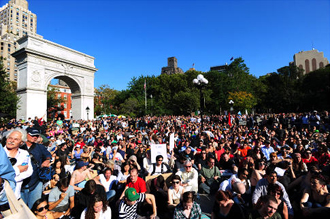The “Occupy Wall Street” demonstrations spreading across four continents protest a condition that’s inherently the product of capitalist, free-market-based societies.
China — having been conceived as a communist nation that still remains nominally socialist — can still be a bit smug about their spread. It announced today that the movement “merits study”, meaning that its principles aren’t necessarily inimical to the philosophy of China’s ruling Communist Party.
Of course China too has developed a huge wealth gap between the top 1% and the remaining 99%. But for once it can truthfully claim that the problem has been imported from western democracies, the ones that have been hounding it about human rights. And precisely because China has never pretended to grant freedom of political expression to its citizens, it enjoys a virtual firewall against the spread of the Occupy Wall Street movement.
If the movement catches fire and the global capitalist system looks to be teetering on the brink of chaos, China’s leadership would have little difficulty reversing some of the free-market reforms it began in 1979 under Deng Xiaoping’s dictum “To become rich is glorious.”
The vast majority of China’s richest tycoons are entrepreneurs who pulled themselves up by the bootstraps. Many compete successfully against China’s state-run businesses. Though most such tycoons are smart enough to stay on good terms with government officials, they don’t enjoy the same degree of protection as state-owned enterprises that directly put money into the pockets of government officials and quasi-government officials. China’s most successful entreprenerial businesses like Baidu and Sany can be quashed out of existence in China just as easily as Google China’s search business was pressured out due to its refusal to cooperate with government measures aimed at controlling search results.
So unlike the Jasmine Revolution, for example, which targets non-democratic governments like China’s, the Occupy Wall Street movement targets the capitalist system, at least as presently manifest. The collapse of that system would bring decades of chaos to countries like the U.S., Germany, Britain, France, Japan, S. Korea and India. For China it would merely strengthen its position, making it a continent of stability in a sea of chaos. It would attract trillions in fleeing capitalist wealth and top capitalist talent, quickly becoming the center of a new civilization based on “socialist principles with Chinese characteristics”.
Of course China can’t be entirely certain of being able to contain its own version of Occupy Wall Street. Despite its fearsome security and ironclad control over dissidents, a few pop-up protests have been materializing. Recently a pop-up demonstration titled “Occupy Shanghai” made an appearance on a Facebook page. It has a photos of a man in a panda mask taken at various locations across Shanghai. In each he is holding a sign reading, “We are the 99 percent. We do not need greedy financial system. We need to move forward mankind.”
There is also an “Occupy Beijing” Facebook page though it can only be accessed using censorship-evading software.
Last week in a park in Zhengzhou, capital of Henan province, a group of elderly men mounted a brief demonstration that was videotaped. They wore red armbands reading “Proletarians of the world, Unite!”
It was a surreal flashback to the early 20th century, one that should warm the hearts of many old-line communist leaders.

